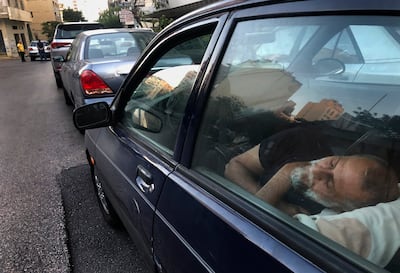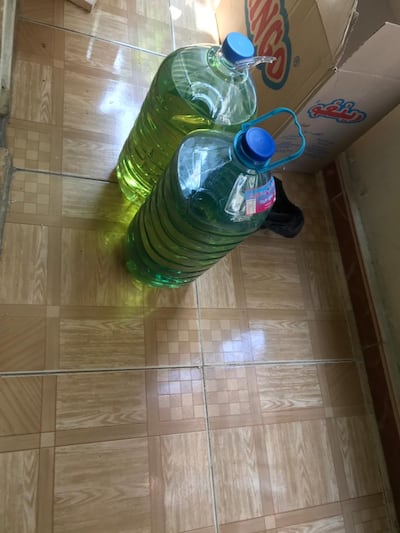Drivers in Lebanon are paying three to four times the official price for petrol on the black market as shortages of fuel intensify throughout the country.
For more than a month, long queues have formed in front of petrol stations, which have been rationing fuel amid a scarcity caused by the country’s lack of foreign currency for imports.
This has left many customers with two options: buying expensive black-market fuel or waiting in line for hours in the heat.
Taxi company owner Toufic told The National his fleet of 20 cab drivers were unable to work earlier this week because drivers were either queuing at the pump or had run out of fuel.
“I have no choice but to buy fuel for three, four times the price or else we cannot work,” he said.
The black market for petrol and diesel has become a fact of life, with advertisements for “fuel deliveries” appearing on Facebook groups and street vendors selling petrol by the gallon on highways outside Beirut.
The illegal trade is the latest sign of the disintegrating rule of law in Lebanon as the state struggles to provide basic services.
The Lebanese pound has lost more than 90 per cent of its value since the onset of an economic crisis in late 2019. The meltdown was triggered by decades of corruption and a lack of foreign currency, necessary for imports of fuel and others essential products.
The government has subsidised fuel, medicines and other imported necessities for decades, but the crisis has forced a cut in the fuel subsidy.
Twenty litres of petrol used to cost 40,000 Lebanese pounds, worth $26 at the defunct official conversion rate and roughly $2 at the current market rate. But the government nearly doubled the price last week, setting it at about 70,000 pounds per 20 litres of petrol.
Black-market vendors are selling 20 litres for 220,000 to 300,000 Lebanese pounds, nearly half the minimum wage in Lebanon.
Toufic says he used to pay 50,000 Lebanese pounds for a full tank; now it costs him at least 230,000 Lebanese pounds. At the same time, inflation has slashed the value of his earnings.
“Selling black-market fuel is so lucrative that practically everyone is becoming an illegal vendor. Some cab drivers are even doing it,” he said.

Mohamed, another taxi driver, says his go-to vendor is a lorry driver who fills his tank at the petrol station, then sells the fuel for twice the price.
“This is illegal, but it’s the only way for us to keep working. The state is not doing anything to help,” he said.
The black market for fuel extends to diesel, which is needed to run the privately operated generators that make up for long power cuts.
Abir, a homemaker who leads a building committee, said residents had to pay nearly three times the official price of diesel to fill up the property’s generator tank last week.
“The electricity is only available two hours per day. Had we not secured diesel, even at a higher price, we would not have any power at all right now,” she said.
George Brax, who leads the syndicate of petrol station owners, told The National that in the absence of a long-term solution for fuel imports, the shortages are encouraging petty crime, organised criminality and cross-border smuggling.
“The low prices of subsidised products in Lebanon have encouraged smuggling to Syria, where fuel is more expensive and scarce,” he said.
The Lebanese army routinely arrests people smuggling tonnes of subsidised Lebanese goods into Syria from border areas controlled by Hezbollah.
A smuggler and a security source previously told The National that hundreds of tonnes of wheat, fuel and other cheap subsidised goods are routinely smuggled into Syria, where shortages are even more severe.
The Iran-backed Lebanese militia holds sway over the border and is fighting alongside Syrian President Bashar Al Assad in the country’s 10-year civil war.
As poverty levels rise, the fuel shortage has encouraged even people with no criminal history to work black market. More than half of Lebanon’s population now lives below the poverty line, according to UN data, up from 28 per cent in 2019.

“Those are generally motorcycle riders who fill up their tank, then take out the fuel and sell it at a higher rate to drivers who are tired of waiting at the pump,” Mr Brax said.
It has also attracted organised crime networks who have the capacity to sell thousands of litres of fuel at a time, he said.
“Those people are part of the same networks that smuggle fuel to Syria,” he said.
“We are urging security forces to act.”
Fights that have sometimes turned deadly have erupted at gas pumps throughout the country.
A petrol station owner told The National that Lebanon’s sectarian political parties, widely blamed for corruption and for fomenting the economic crisis, are filling the security gap left by the state. He requested anonymity because of the sensitive nature of the topic.
Parties have sent their supporters to fuel pumps in areas under their influence to manage long queues and disputes.
“The guys are helping us manage the queues and avoid chaos. We only pay for their meals,” he said.
His station is in a region controlled by Hezbollah and its Shiite ally Amal.
“We have had fist fights here – some people have pulled knives on my employees. Security forces only intervene if shots are fired.”







